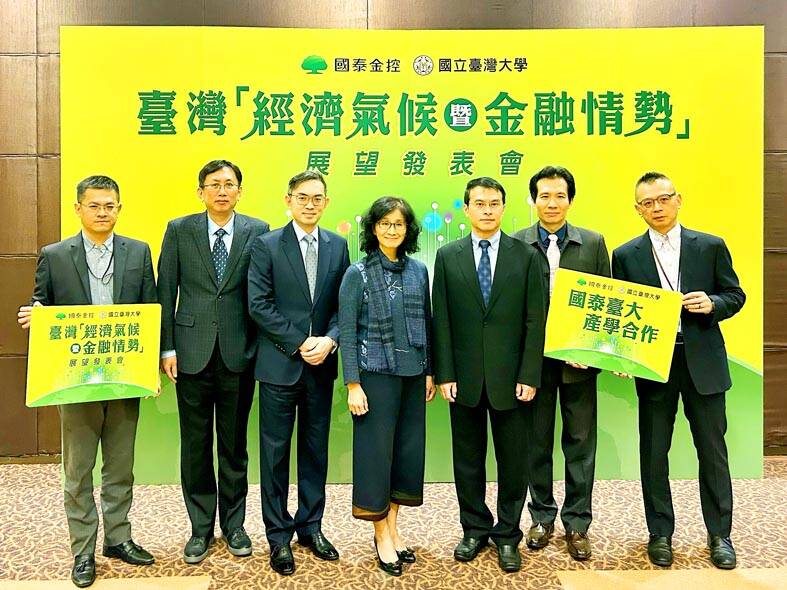Cathay Financial Holding Co (國泰金控) yesterday raised its forecast for Taiwan’s economic growth this year from 2.8 percent to 3 percent, saying that robust demand for artificial intelligence (AI) products would help exports come out of the woods.
The projection is lower than the 3.43 percent increase that the Directorate-General of Budget, Accounting and Statistics (DGBAS) predicted last month, as the research team is less optimistic about private investment and consumer spending.
“Upcoming electricity rate hikes would weigh on private consumption and corporate margins,” National Central University economics professor Hsu Chih-chiang (徐之強) said on behalf of the panel.

Photo: Wu Hsin-tien, Taipei Times
Policymakers and experts are due to review electricity rates this month. Government officials have indicated that rate increases across the board are necessary to reflect rising costs and to keep debt-ridden Taiwan Power Co (台電) afloat.
The electricity rate hikes, which are to go into effect next month, would also negatively affect corporate earnings, as industrial and commercial users face steeper adjustments, Hsu said.
As the DGBAS has said that every 10 percent increase in electricity rates would push up inflation by 0.2 percentage points, the Cathay Financial team expects consumer prices to rise 1.9 percent this year, higher than its previous forecast, he said.
Private consumption, the main growth driver last year, would take a backseat this year due to lingering inflationary pressures, weakening “revenge spending” and a high comparison base last year, he said.
Meanwhile, companies are still conservative about capital expenditure, with private investment likely to remain in contraction territory this quarter, as evidenced by poor imports of capital equipment, especially for semiconductors, he said.
Exports would again become a key growth driver, aided by strong global demand for AI equipment and applications, he said.
Taiwan is home to the world’s largest suppliers of high-end chips and servers.
Against that backdrop, the central bank is likely to hold interest rates steady next week and the entire year in a bid to tame inflation and support the economy, Hsu said.
The neutral policy stance would continue even if the US Federal Reserve cuts interest rates in the second half of this year to avoid an economic hard landing in the US, Hsu said.
Taiwan’s central bank has maintained its discount rate at 1.875 percent since March last year.
That rate is quite low, compared with the Fed’s 5.25 to 5.5 percent rate, rendering rate cuts unnecessary for Taiwan’s central bank, he said.

Taiwan’s long-term economic competitiveness will hinge not only on national champions like Taiwan Semiconductor Manufacturing Co. (TSMC, 台積電) but also on the widespread adoption of artificial intelligence (AI) and other emerging technologies, a US-based scholar has said. At a lecture in Taipei on Tuesday, Jeffrey Ding, assistant professor of political science at the George Washington University and author of "Technology and the Rise of Great Powers," argued that historical experience shows that general-purpose technologies (GPTs) — such as electricity, computers and now AI — shape long-term economic advantages through their diffusion across the broader economy. "What really matters is not who pioneers

In a high-security Shenzhen laboratory, Chinese scientists have built what Washington has spent years trying to prevent: a prototype of a machine capable of producing the cutting-edge semiconductor chips that power artificial intelligence (AI), smartphones and weapons central to Western military dominance, Reuters has learned. Completed early this year and undergoing testing, the prototype fills nearly an entire factory floor. It was built by a team of former engineers from Dutch semiconductor giant ASML who reverse-engineered the company’s extreme ultraviolet lithography (EUV) machines, according to two people with knowledge of the project. EUV machines sit at the heart of a technological Cold

TAIWAN VALUE CHAIN: Foxtron is to fully own Luxgen following the transaction and it plans to launch a new electric model, the Foxtron Bria, in Taiwan next year Yulon Motor Co (裕隆汽車) yesterday said that its board of directors approved the disposal of its electric vehicle (EV) unit, Luxgen Motor Co (納智捷汽車), to Foxtron Vehicle Technologies Co (鴻華先進) for NT$787.6 million (US$24.98 million). Foxtron, a half-half joint venture between Yulon affiliate Hua-Chuang Automobile Information Technical Center Co (華創車電) and Hon Hai Precision Industry Co (鴻海精密), expects to wrap up the deal in the first quarter of next year. Foxtron would fully own Luxgen following the transaction, including five car distributing companies, outlets and all employees. The deal is subject to the approval of the Fair Trade Commission, Foxtron said. “Foxtron will be

INFLATION CONSIDERATION: The BOJ governor said that it would ‘keep making appropriate decisions’ and would adjust depending on the economy and prices The Bank of Japan (BOJ) yesterday raised its benchmark interest rate to the highest in 30 years and said more increases are in the pipeline if conditions allow, in a sign of growing conviction that it can attain the stable inflation target it has pursued for more than a decade. Bank of Japan Governor Kazuo Ueda’s policy board increased the rate by 0.2 percentage points to 0.75 percent, in a unanimous decision, the bank said in a statement. The central bank cited the rising likelihood of its economic outlook being realized. The rate change was expected by all 50 economists surveyed by Bloomberg. The